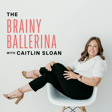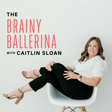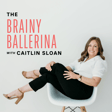
49. The Power of Self-Compassion in a Dance Career with Bodhi Core Founder Ayça Anıl
In this inspiring episode, we sit down with Ayça Anıl, professional ballerina and founder of Bodhi Core, to explore the intersection of artistry, movement, and holistic wellness. From dancing principal roles at Istanbul State Opera and Ballet to becoming the first Turkish ballerina to dance professionally in the UK, Ayça’s journey is nothing short of extraordinary.
We talk about her prestigious training at the John Cranko School and Central School of Ballet, the experience of working with the iconic Alessandra Ferri, and what it means to embody strength and grace both on and off stage.
Ayça also shares how her passion for yoga, mindfulness, and Pilates led to the creation of Bodhi Core—a wellness platform designed to empower individuals through intentional movement. Tune in to hear how she blends classical technique with modern movement practices to help students move with confidence, presence, and purpose.
Highlights From This Episode:
✨Ayça’s ballet journey from Istanbul to the UK and back
✨Vulnerable stories from Ayça’s life that led her to focus on her physical and mental health
✨ The role of mindfulness and movement in injury prevention and longevity
✨ Her Why behind founding Bodhi Core and her holistic teaching philosophy
✨How yoga, Pilates, and meditation support dancers and non-dancers alike
Connect with Ayça
Check out Bodhi Core www.bodhicore.com
Check out Ayça on Instagram @aycaanil
Links & Resources
Get your copy of the Intentional Career Handbook
Visit the Ballet Help Desk website today!: https://ballethelpdesk.com/
Let’s connect!
My WEBSITE: thebrainyballerina.com
INSTAGRAM: instagram.com/thebrainyballerina
Questions/comments? Email me at caitlin@thebrainyballerina.com
This episode was brought to you by the Pivot Ball Change Network.


